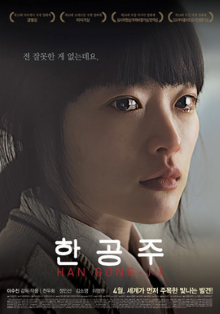
Here’s a South Korean film from a director, Lee Su-jin, whose work we’ve never seen before and is in fact his directorial debut. This one is somewhat difficult to judge as it plays up the mystery of what it’s actually about and keeps it up right until the end. Yet since it was based on real events in South Korea, the public could not have not known what it’s about. How this affects domestic audiences and international ones would therefore be very different as the former would instantly recognize what is being referenced while the latter would be genuinely mystified just as we were.
Han Gong-ju is a school girl who is hurriedly moved to a new school mid-term by a teacher under mysterious circumstances. The teacher arranges for her to stay with his own mother who is a shopkeeper. In school Gong-ju is reluctant to engage with the other students but is eventually noticed for her musical talent by some other girls while practicing on her own. She goes to some effort to locate her mother but she finds her discovers that she has moved on with a new life. Brief flashbacks gradually reveal what happened to her. She and another girl was raped by a large group of boys, at least one of whom has a police inspector as a parent. When the location of her new school is revealed by the other girls posting a video of her music performances online, the parents of the boys who are now on trial for the crime rush to condemn her for causing trouble and pressure her to sign a petition to have them freed.
For a film that occasionally flips between scenes of the past and the present, Han Gong-ju actually keeps things quite clear for the most part and you won’t have difficulty telling which scenes are flashbacks. But it does try way too hard to keep what really happened to the main character a mystery, going to the extent of dropping some subtle hints that the supernatural may be involved. It works to keep your interest and prevents the audience from divining the overall direction of the film too early but it also shifts the emotional focus away from the depth of the tragedy. The director also goes to some effort to show that though the main character continues to suffer from the psychological and even physiological trauma of the rape, she for the most part remains a normal girl who is well on the way to healing. I think this may be motivated by the director’s judgment that a girl who is more obviously damaged would be seen in a less sympathetic light by the audience but it also raises more doubts as to what really happened. Again South Korean audiences will know what happened so the effect will be different on them, but to us, it feels like a strange directorial decision.
Once you do realize what is really going on, the film is excellent. The pain of the multiple rapes and abuse is palpable, yet conveyed in a way that doesn’t feel exploitative at all. But worse than even the events of that fateful night itself is how Gong-ju is utterly abandoned by society in its wake. The film goes to great lengths to show how all of the adults have failed her: her parents, the government, the school, every authority figure in fact. Even the teacher who helps her move to a new school seemingly does it only because it’s his job without an ounce of sympathy. I think it actually stretches credibility a bit as not even a single adult genuinely tries to comfort her but it does work to show how such a victim can find herself feeling completely alone in this situation. As the film poignantly puts it, she is the victim yet the whole of society acts as if she is the one who has done something wrong.
As much as I want to like this film, on balance I think it’s flawed. The focus shouldn’t be on the mystery of exactly what happened. Also odd is the subplot about the landlady’s affair with a married man. I take it that it’s meant to represent another way that Korean society shames women but it’s really not the same thing at all and the incident doesn’t even make her a reliable ally for Gong-ju. The trial of the perpetrators is something that happens in the background without Gong-ju’s involvement at all. We simply never get a full picture of what’s going on at all. It’s a laudable attempt to dramatize the infamous Miryang gang rape incident but it really only captures a tiny slice of the true horrors that the real victims went through.